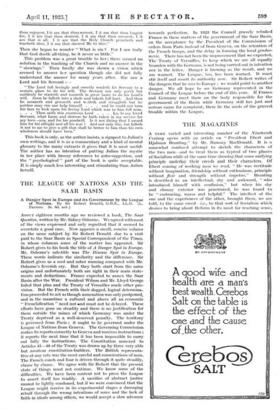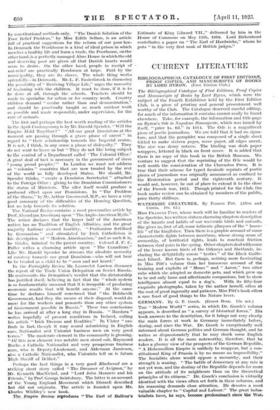THE MAGAZINES
A VERY varied and interesting number of the Nineteenth Century opens with an article on " President Ebert and HjalMan Branting," by Mr. Ramsay MacDonald. It is a somewhat confused attempt to sketch the characters of the two men—and to treat them as typical of two phases of Socialism while at the same time showing that some unifying principle underlay their creeds and their characters. Of Ebert coming of working men we read, " Ire was rectitude without imagination, friendship without enthusiasm, principle without flair and strength without impetus." Branting is descii bed as an intellectual, shy and awkward, " who introduced himself with confusion," but when his shy and clumsy exterior was penetrated, he was found to be " embracing, warm and helpful." The intellect of the one and the experiences of the other, brought them, we are told, to the same creed—i.e., to that sort of Socialism which desires to bring about Reform in its most far reaching sense,
by constitutional methods only. "The Danish Solution of the Poor Relief Problem," by Miss Edith Sellars, is an article full of practical suggestions for the reform of our poor law.
In Denmark the Workhouse is a kind of ideal prison in which men live a healthy life and learn a trade, the Poorhouse, on the other hand, is a perfectly managed Alms House in which the old and deserving poor arc given all that Danish hearts would. seem to desire. On the other hand, people in receipt of out-relief are practically Bondsmen at large. Paid by the municipality, they are its slaves. The whole thing works splendidly—in Denmark. Mr. L. F. Easterbrook in discussing the possibility of " Reviving Village Life," urges the necessity of beginning with the children. It must be done, if it is to be done at all, through the schools. Teachers should be made to specialize for urban or for country work. Country children demand " ocular rather than oral demonstration," and should be practically taught as much outdoor work as possible and made responsible, under supervision, for the care of animals.
The first and perhaps the best worth reading of the articles in the April Contemporary is by Mr. Harold Spender, "Will the Empire Hold Together ?" "All our great Dominions at the moment are passing through a grave phase of unrest " in regard to " their relationship towards the Imperial centre. It is not, I think, in any sense a phase of disloyalty." They do not want to leave us but " They do not like being subject to the control of a Department called ' The Colonial Office.' A great deal of tact is necessary in the government of "these
young proud peoples.' " In London we must not address as " colonies " countries that are now treated by the rest of the world as fully developed States. We should, Mr. Spender thinks, " create a Dominion Secretariat " attached to the Foreign Office : giving to the Dominion Commissioners the status of Ministers. The offer itself would produce a profound effect upon our Dominions. In " The Problem of the Slums," by Mr. Arthur Greenwood, M.P., we have a very good summary of the difficulties of the Housing Question, but no help towards its solution.
The National Review contains a most provocative article by Prof. Alvord (an American) upon " The Anglo-American Myth." The writer declares that the larger half of the American nation has no Tradition of English Affinities, and the great majority harbour avowed hostility. " Puritanism fertilised by Germanism " and stimulated by Irish Catholicism is his description of " Modern Americanism," and as such it is, he thinks, inimical to the parent country. Colonel J. F. C. Fuller writes a charming article upon " The Canadians." Like Mr. Harold Spender he stresses the absolute necessity of courtesy towards our great Dominion—who will not bear to be treated as a child to be " seen and not heard."
In the Fortnightly Review Mr. Launcelot Lawton discusses the report of the Trade Union Delegation on Soviet Russia. He controverts the Delegation's verdict that the dictatorship has justified itself, believing in fact that the " whole system is so fundamentally unsound that it is incapable of producing economic results that will benefit anyone." At the same time he declares himself convinced that " the Bolshevik Government, had they the means at their disposal, would do more for the workers and peasants than any other system of Government possible in Russia." These two conclusions he has arrived at after a long stay in Russia. " Macdara " writes hopefully of present conditions in Ireland, calling his article " Irish Dreams and Realities." In Ulster " one finds in fact, though it may sound astonishing in English ears, Nationalist and Unionist business men on very good terms." The moderate element in the community is growing. " Of this new clement two notable men stand out, Raymond Burke, a Catholic Nationalist and very prosperous business man, who is Deputy-Lieutenant, and Alderman Jamieson, also a Catholic Nationalist, who Unionists tell us is future High Sheriff of Belfast."
Perhaps the best things in a very good Blackwood are a striking short story called " The Dreamer of Avignon," by Mr. Kenneth MacNichol, and "Lord John Manners and his Friends," by Prof. George Saintsbury. The latter is an account of the Young England Movement which Disraeli described but did not originate. The article is founded upon Mr. Charles Whibley's new book.
The_ Empire Review reproduces 4 The Earl of Balfour's
Estimate of King Edward VII.," delivered by him in the House of Commons on May 11th, 1910. Lord Birkenhead contributes a paper on " The Earl of Hardwicke," whom he puts " in the very first rank of British judges."











































 Previous page
Previous page